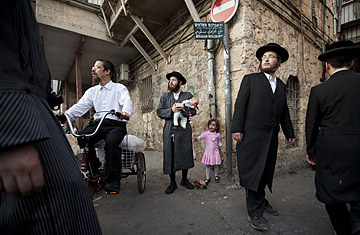
Ultra Orthodox Jews attend the funeral of Rabbi Yosef Shalom Elyashiv in Jerusalem, Wednesday, July 18, 2012. Elyashiv, revered by Jews worldwide as the top rabbinic authority of this generation for his scholarship and rulings on complex elements of Jewish law, died Wednesday, hospital officials said. He was 102.
(5 of 6)
His crusade began after a pair of neighborhood pools banned mixed swimming during daylight hours. It gained steam when unlicensed synagogues appeared in homes and storefronts. The city forced some to close. Others Pinchasi shut himself, squirting glue into the locks.
"Then there's the eruv thing," Pinchasi says. An eruv is a boundary, a wire stretched around a Jewish town. Inside it, observant Jews are permitted to carry things--a purse, a prayer book--that they would otherwise be barred from lifting during the enforced rest of the Sabbath. There's an eruv around the whole of Jerusalem, but newly arrived residents of Kiryat Yovel wanted their own. Without asking, they stuck poles on private property and strung wire between them.
Pinchasi got a saw. The racket drew witnesses, and he spent a night in custody. "We learned it was illegal to cut down even illegal poles," he says. After that he found a more discreet way to cut wood, a kind of lacerating rope--"very quiet," Pinchasi says--but the ultra-Orthodox answered his innovation with their own, girdling poles in steel sheaths. So Pinchasi went for the wire. To reach it, as high as a phone line, he first struggled with a Ginsu knife lashed to a stick. Then he discovered the Wolf-Garten professional tree trimmer. Made in Germany. It extends up to 4 m. 250 shekels (about $65). "The best of its kind," he says, flourishing the contraption like a saber.
The man is full on. Pinchasi parks in the shadows, pulls up the hoodie and runs in a crouch. He snips the wire at one, two, three poles, then leaves behind a sticker: pirate eruv over a skull and crossbones. One night, about 30 ultra-Orthodox youths caught him in the act and roughed up his crew, including a Hebrew University professor. "To Prof. Dan and Noam, the secular maniacs," reads graffiti on a utility box near their homes. "Stop. Get out of the neighborhood. You're in our sights," signed "The commando of the neighborhood."
Pinchasi drives to Gibli's neighborhood, parks and reaches for the posters. Botticelli's The Birth of Venus goes up on a synagogue door, then on a recycling bin directly across the street. "My basic assumption," Pinchasi says, "is if they feel uncomfortable, they won't come here."
Down but Not Out
The bookish ultra-Orthodox have their militants too, hard-eyed zealots whose extremism defines not only the public debate but increasingly the public spaces of Jerusalem. Downtown billboards in Israel's capital no longer feature women; advertisers fear defacement or, worse, boycotts. On public buses, ultra-Orthodox women sit in the back--a situation Hillary Clinton likened to the pre-segregation South when it bubbled up in the controversy that consumed Israel in December. In Bet Shemesh, a half-hour outside Jerusalem, ultra-Orthodox men spit on an 8-year-old girl who was on her way to school, calling her a "whore" for her long-sleeved clothes, which were not conservative enough for their standards.
